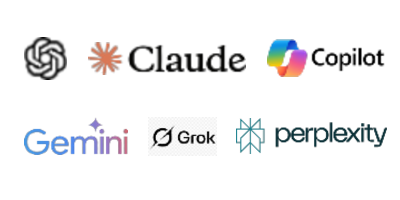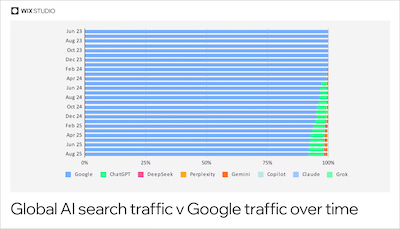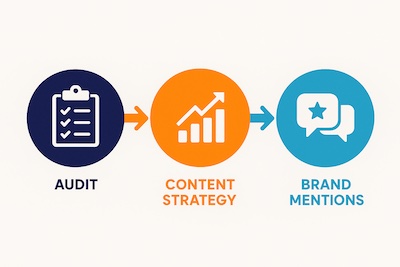Search is changing. Customers aren’t just clicking links anymore; they’re asking AI answer engines like ChatGPT, Gemini, and Perplexity for direct, human-like answers. If your brand isn’t showing up in those answers, you’re invisible.
That’s where Answer Engine Optimization (AEO) comes in. We help your business stay visible, relevant, and chosen in the age of AI-powered search.
What is an answer engine?
An answer engine is a search tool that delivers direct, concise answers instead of a list of links. Unlike traditional search engines, answer engines extract facts from structured or unstructured data to provide complete information, thereby reducing the need to click through to external pages.

Popular answer engines include ChatGPT, Gemini, Perplexity, Claude, Copilot, and Grok. Answer engines are multimodal and understand text, images, audio and video. They excel at providing direct answers in a human-like response, making them invaluable for research.
Why should you care

Changing search behaviour
In August 2025, an estimated 8.2% of global search traffic was directed to LLM-based and AI answer engines, including ChatGPT, Gemini, Perplexity, Claude, Copilot, and Grok. This represents a continued trend of month-over-month growth for AI-powered search, up from 8.0% share in July 2025. This means that while traditional search remains important, a valuable set of your customers are using answer engines to find details about your products and services.
Rise of zero-click search
Because these tools provide direct answers, websites have experienced a significant drop in traffic. Visibility in the responses an answer engine offers is crucial to ensure your business remains relevant and in the decision-making set of your customers.
Vote of confidence
When an LLM mentions your brand, it’s like a vote of confidence from a trusted committee. Ensuring your brand appears when your customers are searching for your products and services is crucial to success in 2025 and beyond.
We don’t believe this is a gold rush scenario, but neglecting to consider how to approach LLM visibility for your brand may result in missing out on significant opportunities.
AEO vs SEO: What’s the difference
| Aspect | AEO (Answer Engine Optimization) | SEO (Search Engine Optimization) |
| Core Technology | Built on semantic search – focuses on meaning, context, and intent. | Traditionally based on lexical search – matching keywords and phrases, though now evolving with semantics. |
| Query Handling | Uses Query Fan Out (QFO): expands one query into multiple related questions and synthesizes a comprehensive answer. | Focuses on matching the user’s original query and ranking pages most relevant to it. |
| Content Relevance | Evaluates meaning beyond just words; passages and context are critical. | Historically keyword-driven, though now also considers topical authority and semantic relevance. |
| Content Strategy | Optimized at the passage level: create answers that align with customer needs, journey stages, and intent. | Optimized at the page level: ensure full-page keyword targeting, backlinks, metadata, and site structure. |
| User Experience Goal | Provides direct, synthesized answers to questions. Aims to solve the user’s problem in fewer steps. | Provides a list of relevant links for users to choose from and explore further. |
| Approach to Searcher Intent | Deeply considers who is searching, why, and their journey (holistic, conversational). | Focuses on what is being searched (keywords, search volume, competition). |
| Tools & Platforms | Leveraged by LLM-powered engines (e.g., ChatGPT, Perplexity, Bing Copilot, Google SGE). | Used in traditional search engines (e.g., Google Search, Bing, Yahoo). |
| Content Creation Focus | Crafting solutions-oriented, concise, and authoritative answers. | Building comprehensive, keyword-optimized webpages to attract rankings. |
The difference between AEO and SEO is subtle. The foundation of an answer engine is semantic search. Traditional search, to a lesser extent today, relies on a lexical model. This means that relevance extends beyond mere words on a page. It’s about the meaning of those words on a page.
Answer engines also follow multiple queries to provide you with a reply. When you type “Best Nike basketball shoes,” the answer engine will search additional synthetic questions that are related or implied by the original query, like:
- “Best Nike basketball shoes for guards”
- “Are Nike basketball shoes good for casual wear?”
- “Are expensive Nike basketball shoes really better?”
- “Nike basketball shoes with React foam”
- “Nike vs Adidas basketball shoes: Which are better?”
- “Best Nike basketball shoes endorsed by LeBron James”
The system then reviews the documents from these parallel searches and generates a comprehensive response to your query. Google refers to this as Query Fan Out (QFO), but all major LLMs employ a similar process.
While many of the tactics are similar between AEO and SEO, the strategies employed differ. You must start thinking about content at a passage level and consider the entire customer journey. This is why we spend an enormous amount of time thinking about who is searching for your product, their wants and needs, and how we can best provide a solution to them.
How do you optimize for Answer Engines

Website audit
First, we begin with an audit of your website to ensure that all LLMs and search engines can find your content. This is no different than our SEO consulting. If a crawler can’t find or read your content, none of the rest of this section matters, so this is the first step.
Content strategy
Content strategy becomes the next lever for us to optimize your website for answer engines. Unlike SEO, we’re less focused on volume and more focused on your audience. We spend a lot of time understanding who they are, what they need and the questions they ask. We pair this with in-depth research into synthetic queries and our tool stack, including custom GPTs, to identify the content that matters most. All of this is summarized in a content strategy plan that can be executed with precision.
Brand mentions and link building
Because answer engines are based on probabilities, we work diligently to secure your brand’s placement on other websites. While this is typically referred to as link building, we don’t care about the actual link. We want to see your brand mentioned on other websites to build a connection within a topic and influence the algorithm. Essentially, we aim to make your brand the most referenced brand in its category.
AEO challenges and best practices
- Measurement gaps: LLMs are personalized and provide different answers each time a search is performed. This means that taking a pulse is difficult since the answer I get will be different from the answer you get. Digital marketing metrics must be different as well.
- Content quality: It’s expected that the best content will need to be more original and of higher quality to remain visible. If an answer engine already knows the answer, it won’t even perform a search, and that will leave you in the cold.
- Emerging platforms: LLMs and AI-powered search engines are infants and new entrants are coming online frequently. This ensures that our strategies and tactics must remain nimble in order to thrive.
Agency and direct client support
We work with top agencies and brands that want to exceed expectations. For our agency clients, we support the entire process, from strategy to execution, and are involved in client communication as needed. You can call this a white glove service, but that’s too preppy for us; however, we’ll be at your side when you need us.
When working directly with your business, we’re big on collaboration and engagement. We’ll work closely with your team to understand the nuances of your business and its customers. We communicate frequently and keep you in the know with transparent, real-time reports.
How much does AEO cost
Our AEO services start at $2,000 per month. Reach out to apply to be a client.
Client testimonials
Jordan is an exceptional digital marketing strategist. He is data-minded and his ability to extrapolate data into key insights is strong. He has helped me build content strategies that are customer-focused and geared to driving lead acquisition. I’d highly recommend Jordan and look forward to working with him on additional projects.
–Kyle Gershbain, VP Content, Row 1 Media
How does AEO impact traditional SEO strategies?
AEO (Answer Engine Optimization) shifts SEO strategy by prioritizing direct, concise answers for search engines like Google, ChatGPT, and voice assistants. Traditional SEO focuses on keywords and backlinks, while AEO emphasizes structured data, intent clarity, and snippet-ready content to rank in AI-driven results.
What industries benefit most from AEO?
Industries that benefit most from AEO include healthcare, finance, legal, education, and ecommerce. These sectors rely on accurate, fast answers for search visibility. AEO helps them capture featured snippets, voice search results, and AI assistant responses by delivering clear, structured content aligned with user intent.
How do you measure AEO success if answers are personalized?
Measure AEO success by tracking visibility in featured snippets, voice search rankings, and AI assistant responses. Use tools like Google Search Console, schema validation, and zero-click metrics. Personalization makes outcomes variable, but consistent appearances across diverse queries signal effective optimization.
What role does structured data play in AEO?
Structured data enables AEO by helping search engines understand and extract direct answers from content. It defines entities, relationships, and context using schema markup, which increases the chances of appearing in featured snippets, voice search results, and AI-driven responses.
Can small businesses compete with large brands in AEO?
Small businesses can compete in AEO by creating clear, structured content that answers specific user questions. Unlike traditional SEO, AEO favours precision and relevance over domain authority. By optimizing for intent, using schema markup, and targeting long-tail queries, small sites can win featured snippets and voice results.
